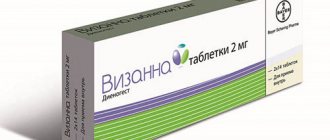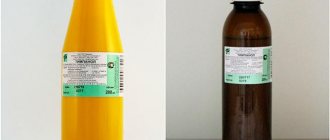Alprazolam tablets
The product is available in one form - tablets for oral administration, which are packaged in a jar, or blisters of 10 or 50 pieces. There are pills with different dosages, this should be taken into account when purchasing. Alprazolam belongs to the group of anxiolytics or anti-anxiety tranquilizers. It is rarely prescribed for long-term treatment due to addiction. Alprazolam is prescribed in short courses to quickly relieve nervous disorders.
Related articles Treatment of dandruff at home Grandaxin indications Tranquilizers drugs
The antidepressant has muscle relaxant and anxiolytic activity, anticonvulsant and hypnotic effects. Alprazolam is taken to relieve feelings of anxiety and unreasonable anxiety. It allows you to increase the duration and quality of sleep, reduce the time it takes to fall asleep and wake up. Alprazolam tablets relieve brain excitability and dull the body's reflexes. The anticonvulsant effect is to relieve muscle tension and eliminate spasms. This leads to relaxation of the body and emotional calm.
Composition of Alprazolam
Alprazolam tablets have two types of dosage of the active substance of the same name:
- 0.25 mg;
- 1 mg.
The drug contains auxiliary components:
- potato starch;
- magnesium stearate monohydrate;
- lactose monohydrate;
- low molecular weight povidone.
Pharmacological properties of Alprazolam
The drug is a high-potency benzodiazepine, which enhances the inhibitory effect of gamma-aminobutyric acid in the central nervous system and increases the sensitivity of GABA receptors to this mediator. The mechanism of the sleeping pill is as follows: when it enters the intestine, the active substance is quickly absorbed into the body. The maximum concentration of alprazolam is achieved 1-2 hours after taking the tablets. The active substance is metabolized in the liver, and the resulting metabolites are excreted from the body naturally in the urine.
Indications for use
Tablets are prescribed by the attending physician when diagnosing the following problems:
- Neuroses, anxiety, irritability, anxiety disorders, excitement, emotional stress. At the same time, there is a deterioration in the quality of sleep, nightmares, insomnia, and frequent waking up in the middle of the night.
- Somatic diseases accompanied by excessive sweating, rapid heartbeat, impotence, bulimia, anorexia.
- Anxious-depressive state, leading to decreased mood, loss of interest in what is happening around, isolation or, conversely, agitation, suicidal actions, endogenous depression.
- Neuroses accompanied by loss of appetite, changes in body weight.
- Depression occurring against the background of a disease, for example, the cardiovascular system, oncology, from fear of a heart attack, as a reaction to treatment for alcoholism or drug addiction.
- Phobias of various types, including fear of open space (agoraphobia).
- Tremor.
- Panic attacks.
Indications for use
Prescribed for neuroses and anxiety conditions, which are characterized by a feeling of danger, anxiety and restlessness, accompanied by somatic disorders and deterioration of sleep. The drug is also used for neurotic reactive-depressive conditions, accompanied by anxiety, decreased mood, insomnia, loss of appetite and interest in what is happening around.
The use is effective for panic disorders, phobias, mixed anxiety-depressive states, as well as for neurotic depression that occurs against the background of somatic diseases.
Alprazolam dosage
The number of Alprazolam tablets depends on many factors:
- dosage;
- age, condition of the patient;
- sensitivity to the component.
According to the instructions, tablets are taken orally 2-3 times a day, regardless of meals. The capsule is not chewed, but swallowed whole and washed down with a large amount of clean still water (at least 0.5 cups). The daily dose is not taken at one time, it is divided into two or three doses, while most of Alprazolam must be taken before bed due to the hypnotic effect of the drug on the body. For example, the daily dose of the drug is 2 mg: in this case, the patient takes 0.5 mg in the morning and at lunch, and before bed the dose is 1 mg.
The instructions indicate the maximum daily dosage; it should not exceed 10 mg. For older people over 65 years of age, the maximum norm is 1.5 mg per day. You cannot start treatment without the prescribed dosage. Therapy should begin with a minimum dose of 0.25 mg per day and gradually increase, in two to three weeks it is brought to normal. Depending on the diagnosis, the patient is prescribed the following amount of active substance:
- for anxiety – 0.25-1.5 mg three times a day;
- treatment of depression – 0.5-3 mg three times a day;
- for phobias or panic attacks, the dosage indicated in the instructions is 1-3 mg three times a day.
The course of treatment can be long or short:
- Long-term treatment with Alprazolam tablets is rarely prescribed due to the mass of side effects that the drug can cause. It is prescribed for chronic depression and anxiety.
- A short course of treatment is carried out when it is necessary to suppress an acute, sudden attack of fear or relieve a nervous state. It lasts 3-7 days. In this case, the dosage is 0.25-0.5 mg three times a day.
Stopping the drug
A feature of Alprazolam tablets is the cessation of treatment after a long course of use. This must be done gradually, otherwise the patient cannot avoid the return of increased symptoms of the condition for the treatment of which Alprazolam was prescribed. The duration of Alprazolam withdrawal is from two to four weeks (depending on the dosage). To do this, you need to remove 0.25-0.5 mg of the drug from the daily dose every three days. If reducing the dose by 0.5 mg returns signs of anxiety, a more gradual withdrawal should be carried out.
Instructions for use
The standard instructions for Alprazolam indicate that the tablets are taken two to three times a day orally. The use of drugs is not tied to meals. The dosage should be individualized based on the patient's condition and age:
- If anxiety states occur, it is recommended to take the medicine three times a day, 0.25-0.5 mg. If necessary, the dose can be increased to 4 mg per day.
- For depression, 0.5 mg/3 times every 24 hours is prescribed. Gradually, the amount of the drug can be increased to 4.5 mg. It is recommended to take the initial dose before bedtime. This will help avoid increased sleepiness during the day.
Signs of Depression - Patients of retirement age are prescribed 0.25 mg 2 times a day. If the human body tolerates the medication well, you can increase the amount to 0.5 mg.
Upon completion of the course of treatment, the dosage is gradually reduced. Abrupt cessation can lead to a number of unpleasant consequences. The course of treatment can last from 4 to 12 weeks.
It is dangerous to adjust dosages on your own. An incorrectly selected amount of medication can cause negative reactions or an overdose. To protect your body from undesirable consequences, you should adhere to the treatment regimen established by a specialist.
When taking Alprazolam simultaneously with various medications, their effectiveness may decrease and the risk of complications may increase.
| Medicines | Consequences |
| Fluvoxamine | Leads to an increase in the concentration of the main component of Alprazolam in plasma |
| Anticonvulsant and psychotropic drugs, ethanol, histamine H1 receptor blockers | Increased depressant effect on the nervous system |
| Digoxin | May cause intoxication with cardiac glycosides |
special instructions
When prescribing this medicine, the doctor must make sure that the patient has not taken other tranquilizers and psychotropic substances, and was not an alcoholic: the patient’s sensitivity to the drug depends on this. The effectiveness of treatment with Alprazolam tablets will be lower in people who suffered from alcoholism or drug addiction or took different types of antidepressants. Alprazolam is not recommended to be taken with other sedative medications that cause drowsiness.
A long course of treatment with tablets can cause a patient with depression to become dependent on Alprazolam - benzodiazepine addiction, which is difficult to get rid of. Therefore, it is forbidden to increase or decrease the dosage on your own without consulting a doctor. If the dosage is reduced quickly, you can observe the development of pill withdrawal syndrome, expressed in vomiting, nausea, sweating, insomnia, and anxiety. If during treatment the patient begins to complain of hallucinations, convulsions, aggressiveness, or thoughts of suicide, it is necessary to consult a doctor.
During pregnancy
The tranquilizer Alprazolam should not be taken during pregnancy and lactation. The active substance contained in this drug may cause disturbances in the development and growth of the fetus due to intoxication in the first trimester. In the second trimester of pregnancy, Alprazolam tablets, when used for a long time for more than a month, provoke withdrawal syndrome in a newborn child. In the last weeks of gestation, taking the drug in rare cases causes a disruption in the development of the central nervous system of the newborn's central nervous system.
If a woman took Alprazolam tablets before giving birth, this can lead to a decrease in blood pressure and temperature, respiratory failure, and a weak sucking reflex in the baby. The active ingredient of the drug also passes into milk, so its use is prohibited during breastfeeding. If taking Alprazolam tablets is necessary, the mother should transfer the child to artificial formula feeding.
Drug interactions
Alprazolam tablets, when taken simultaneously with other medications, cause the following factors:
- CNS depression with simultaneous treatment with other psychotropic, anticonvulsant, analgesic drugs, hypnotics and histamine blockers.
- The possibility of overdose with Alprazolam tablets and an increase in its effectiveness when taking oral contraceptives and cardiac glycosides, ketoconazole, itraconazole, paroxetine, fluvoxamine.
- Increased concentrations of Imipramine, antihypertensive drugs.
- Increased toxicity of Zidovudine.
- Respiratory depression when taken with Clozapine.
pharmachologic effect
The main active component included in the drug has an anxiolytic, sedative, hypnotic, anticonvulsant, and central muscle relaxant effect.
The hypnotic effect provided by Alprazolam is accompanied by a decrease in emotional stress, as well as a weakening of feelings of anxiety, fear and restlessness. This product helps improve sleep quality, shorten the period of falling asleep, increase sleep duration, and reduce the number of night awakenings.
Side effects
Alprazolam tablets sometimes have side effects:
- feeling tired, drowsiness, slow reaction, depression, dizziness, disorientation, tremor, insomnia;
- dry mouth, nausea, constipation, diarrhea, impaired liver and kidney function, jaundice;
- anemia, chills, fever, sore throat, thrombocytopenia, neuropenia;
- enuresis, urinary retention, changes in libido, dysmenorrhea;
- decreased blood pressure, tachycardia;
- allergic reaction;
- change in body weight;
- visual impairment.
Side effects
From the nervous system
At the beginning of treatment (especially in elderly patients) - drowsiness, fatigue, dizziness, decreased ability to concentrate, ataxia, disorientation, slowed mental and motor reactions; rarely - headache, euphoria, depression, tremor, memory loss, impaired coordination of movements, depressed mood, confusion, dystonic extrapyramidal reactions (uncontrolled movements, including the eyes), weakness, myasthenia gravis, dysarthria; extremely rarely - paradoxical reactions (aggressive outbursts, confusion, psychomotor agitation, fear, suicidal tendencies, muscle spasms, hallucinations, agitation, irritability, anxiety, insomnia).
From the hematopoietic organs
Leukopenia, neutropenia, agranulocytosis (chills, pyrexia, sore throat, excessive fatigue or weakness), anemia, thrombocytopenia.
From the digestive system
dry mouth or drooling, heartburn, nausea, vomiting, decreased appetite, constipation or diarrhea; impaired liver function, increased activity of “liver” transaminases and alkaline phosphatase, jaundice.
From the genitourinary system
Urinary incontinence, urinary retention, renal dysfunction, decreased or increased libido, dysmenorrhea.
Allergic reactions
Skin rash, itching.
Effect on the fetus
Teratogenicity (especially the first trimester), depression of the central nervous system, respiratory impairment and suppression of the sucking reflex in newborns whose mothers used the drug.
Others
Addiction, drug dependence; decreased blood pressure; rarely - visual impairment (diplopia), weight loss, tachycardia. If the dose is sharply reduced or taken is stopped, withdrawal syndrome occurs (irritability, nervousness, sleep disturbances, dysphoria, spasm of smooth muscles of internal organs and skeletal muscles, depersonalization, increased sweating, depression, nausea, vomiting, tremor, perception disorders, including hyperacusis, paresthesia, photophobia; tachycardia, convulsions, rarely - acute psychosis).
Overdose
Symptoms (taking 50-60 mg)
Drowsiness, confusion, decreased reflexes, nystagmus, tremor, bradycardia, shortness of breath or difficulty breathing, decreased blood pressure, coma.
Treatment
Gastric lavage, taking activated carbon. Symptomatic therapy (maintaining breathing and blood pressure), administration of flumazenil (in a hospital setting). Hemodialysis is ineffective.
Contraindications
The medicine Alprazolam has contraindications. Tablets that relieve anxiety symptoms are prohibited for the following diseases or conditions:
- coma;
- myasthenia gravis;
- angle-closure glaucoma;
- severe depression;
- poisoning with alcoholic beverages or drugs;
- respiratory tract diseases;
- age under 18;
- pregnancy and lactation;
- allergic reaction to the drug.
Alprazolam price
You can buy Alprazolam at the pharmacy. For ease of use, the cost of the product is presented in the form of a table:
| Number of tablets per package, pieces | Maximum price, rubles | Minimum price, rubles |
| 10 | 120 | 105 |
| 50 | 875 | 825 |
Reviews
Ekaterina, 48 years old
A neurologist prescribed me Alprazolam tablets when I came to him complaining of poor sleep and nightmares. I took 1 tablet at night with a dosage of 0.25 mg for a month. I began to sleep better, fell asleep quickly, and did not wake up at night. When the course of treatment ended, everything was fine for six months. Then I had to repeat it.
Rostislav, 64 years old
My review: terrible pills. My therapist prescribed them for me. The condition has improved, but the side effects are tormenting. Constant nausea, bad food, breathing problems. I took them for two or three weeks, 2 tablets twice a day, I don’t remember exactly. I couldn’t stand it, I went to the hospital and asked to be prescribed another medicine.
Irina, 43 years old
I'll leave my review. My husband suffered from panic disorder after being fired from his job due to age. It was very difficult. Treatment was carried out with Alprazolam tablets in courses of one month. I became calmer, I would say detached. There were no side effects. I don’t know what happened next, but his friends offered him another part-time job.
Instructions for use
Instructions for use | "ANTIPOLLIN" - Allergen-specific immunotherapy (ASIT) drug
+7 Mon-Fri: from 9:00-18:00 Sat-Sun: - closed
Menu Close Menu
Description Tablets are white, creamy, with a flat surface. Composition One 0.5 g tablet contains: active substance - pollen allergen from 0.0001 PNU to 1000 PNU Blister No. 1 - 0.0001 PNU, blister No. 2 - 0.001 PNU, blister No. 3 - 0.01 PNU, blister No. 4- 0.1 PNU, blister No. 5- 1 PNU, blister No. 6- 10 PNU, blister No. 7- 100 PNU, blister No. 8- 1000 PNU, blister No. 9- 1000 PNU excipients: ascorbic acid, granulated sugar, talc. Properties: It is a combined preparation of plant origin with a dual effect: 1) immunostimulation of the body in case of secondary immunodeficiency; 2) hyposensitization of the patient to the etiological “culprit” allergen. When a gradually increasing dose of the “culprit” allergen is introduced into the body, causing an allergic reaction, its sensitivity to the significant allergen (allergens) decreases. This allows you to prevent allergic inflammation during periods of high concentrations of allergen in the air and achieve stable remission. Immunostimulation is achieved thanks to the ascorbic acid included in its composition, the main mechanism of which is aimed at a general stimulating effect, as well as at restoring the functioning of humoral and cellular immunity. Indications for use Used for specific immunotherapy of allergic diseases caused by hypersensitivity to pollen: seasonal allergic rhinitis, conjunctivitis, urticaria, dermatitis, bronchial asthma. The effectiveness of treatment of allergic diseases depends on how accurately the “culprit allergen” (one or more) is identified, and therefore the drug is prescribed by an allergist. Contraindications Children under 5 years of age and patients over 66 years of age, exacerbation of hay fever, pregnancy and lactation, severe organic damage to organs, severe chronic infectious diseases (tuberculosis, brucellosis), diseases of endocrine organs (goiter, diabetes mellitus), chronic connective tissue diseases ( rheumatism, collagenosis), cancer, AIDS, mental illness. Drug interactions It is not recommended to use corticosteroids (hormones), beta-blockers, or carry out preventive vaccinations against infections. Restrictions on use During the menstrual cycle, women are recommended to take a short break. It is not advisable to drink alcohol on the days you take the pills. Side effects Reactions to the drug with proper treatment are rare and indicate either an overdose or the presence of these contraindications and violations of the treatment regimen. If severe itching in the mouth, swelling of the oral mucosa, or exacerbation of rhinitis, conjunctivitis, dermatitis and asthma occurs, you must take an antihistamine and contact your doctor to adjust the treatment. Method of administration and dosage The drug "Antipollin" is prescribed by an allergist no later than 2 -2.5 months before the start of flowering of the "culprit" plant. "Antipollin" is used before meals, one tablet per day, sublingually (under the tongue) until completely absorbed, without drinking water. After taking the tablet, it is not recommended to eat or smoke for 30 minutes. The reception consists of three successive stages. Initial course Blister No. 1 - 1 tablet every day Blister No. 2 - 1 tablet every day Blister No. 3 - 1 tablet every day Blister No. 4 - 1 tablet every day Blister No. 5 - 1 tablet every day Main course Blister No. 6 - 1 tablet every day Blister No. 7 - 1 tablet every day Blister No. 8 - 1 tablet every 1 day Maintenance course Blister No. 9 - 1 tablet every 1 or 2 days When prescribing two types of Antipollin, one one view is taken in the morning, another in the evening. Release form and packaging Tablets. The main course package contains 9 blisters of 6 tablets each, for a total of 54 tablets. Instructions for use are included. Shelf life 1 year Conditions of release from pharmacies As prescribed by a doctor , RK, 480019 Almaty st. Makataeva, 34 Tel: 397-75-16, tel/fax 397-75-17 e-mail:
© 2020 Antipollin. All rights reserved
| by order of LLC |
Development and design – Studio “Vector”











